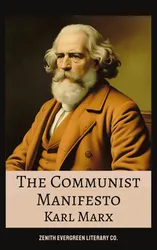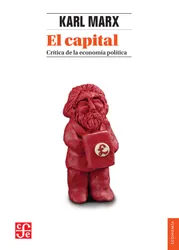In "The Eighteenth Brumaire of Louis Bonaparte," Karl Marx offers a profound analysis of the political upheaval in France during the 1850s, particularly the rise of Louis Bonaparte after the 1848 revolution. Employing a blend of historical materialism and incisive political critique, Marx examines the interplay between class struggle and political power, articulating how varying social strata interact with nascent authoritarianism. The work is not merely a historical account; it is a rich commentary on the cyclical nature of history, foregrounding the concept that 'all great world-historic facts and personages appear, so to speak, twice.' Its literary style is marked by sharp irony and rigorous analysis, situating it within the broader context of Marxist theory and its critiques of modern politics. Karl Marx, a revolutionary thinker and co-author of the "Communist Manifesto," penned this influential work drawing from his deep engagement with the socio-political realities of his time. His interest in class dynamics and revolutionary movements informs the narrative structure of the book, aligning with his overarching philosophy on the role of the proletariat in historical transformation. The tumultuous socio-political landscape of mid-19th century France provided a fertile ground for Marx's exploration of the relationship between individual agency and historical determinism. For scholars, students, and anyone intrigued by the interrelations of politics and society, "The Eighteenth Brumaire of Louis Bonaparte" is essential reading. It not only illuminates the historically contingent nature of political power but also evokes timeless questions about authority and resistance. This book remains a crucial text for understanding the complexities of revolution and the dynamics of class struggle, making it indispensable for contemporary discussions on democracy and power.
The Eighteenth Brumaire of Louis Bonaparte
Starte deine 14-tägige kostenlose Probezeit
- Voller Zugriff auf Hunderttausende von Hörbüchern und E-Books in unserer Bibliothek
- Erstelle bis zu 4 Profile – inkl. Kinderprofile
- Lies und höre offline
- Abos ab € 9,99 pro Monat

The Eighteenth Brumaire of Louis Bonaparte
In "The Eighteenth Brumaire of Louis Bonaparte," Karl Marx offers a profound analysis of the political upheaval in France during the 1850s, particularly the rise of Louis Bonaparte after the 1848 revolution. Employing a blend of historical materialism and incisive political critique, Marx examines the interplay between class struggle and political power, articulating how varying social strata interact with nascent authoritarianism. The work is not merely a historical account; it is a rich commentary on the cyclical nature of history, foregrounding the concept that 'all great world-historic facts and personages appear, so to speak, twice.' Its literary style is marked by sharp irony and rigorous analysis, situating it within the broader context of Marxist theory and its critiques of modern politics. Karl Marx, a revolutionary thinker and co-author of the "Communist Manifesto," penned this influential work drawing from his deep engagement with the socio-political realities of his time. His interest in class dynamics and revolutionary movements informs the narrative structure of the book, aligning with his overarching philosophy on the role of the proletariat in historical transformation. The tumultuous socio-political landscape of mid-19th century France provided a fertile ground for Marx's exploration of the relationship between individual agency and historical determinism. For scholars, students, and anyone intrigued by the interrelations of politics and society, "The Eighteenth Brumaire of Louis Bonaparte" is essential reading. It not only illuminates the historically contingent nature of political power but also evokes timeless questions about authority and resistance. This book remains a crucial text for understanding the complexities of revolution and the dynamics of class struggle, making it indispensable for contemporary discussions on democracy and power.

15+ Political Science. Classics Collection : The Art of War, Tao Te Ching, The Republic, Meditations, The Prince, Utopia, Utilitarianism, Anarchism and others
Sun Tzu, Lao Tzu, Plato, Marcus Aurelius, Niccolo Machiavelli, Thomas More, Tommaso Campanella, Francis Bacon, Thomas Paine, John Stuart Mill, Karl Marx, Friedrich Engels, Vladimir Lenin, Rosa Luxemburg, Peter Kropotkin, Emma Goldman, Leon Trotsky
audiobook
Meisterwerke der Weltphilosophie : Das Gastmahl, Nikomachische Ethik, Also sprach Zarathustra, Utopia, Phänomenologie des Geistes, Neues Organon, Selbstbetrachtungen
Immanuel Kant, Sören Kierkegaard, Edmund Husserl, Ludwig Wittgenstein, Friedrich Nietzsche, - Konfuzius, Platon, Xenophon, - Aristoteles, Lao Tse, Marcus Tullius Cicero, Marcus Aurelius, Plotin, Thomas von Aquin, Niccolò Machiavelli, Thomas Morus, Giordano Bruno, Michel de Montaigne, René Descartes, Francis Bacon, Blaise Pascal, Baruch Spinoza, Gottfried Wilhelm Leibniz, David Hume, Jean-Jacques Rousseau, Friedrich Schelling, John Locke, Georg Wilhelm Hegel, John Stuart Mill, Karl Marx
book
Das Kapital : Kritik der Politischen Ökonomie
Karl Marx
audiobook
The Communist Manifesto
Karl Marx, Friedrich Engels
audiobookbook
The Communist Manifesto: 1888 Translated Edition (The Political Classic of Karl Marx And Friedrich Engels) :
Karl Marx, Friedrich Engels, Samuel Moore
audiobook
La Commune de Paris
Friedrich Engels, Karl Marx
book
The Communist Manifesto : Karl Marx & Friedrich Engels' Revolutionary Call
Friedrich Engels, Karl Marx, Zenith Horizon Publishing
book
The Communist Manifesto : A Landmark in Political Theory and Global Social Movements
Karl Marx, Zenith Golden Quill
book
The Communist Manifesto : A Groundbreaking Vision of Class Struggle and Revolutionary Change
Karl Marx, Zenith Evergreen Literary Co
book
El capital: crítica de la economía política, tomo I, libro I : El proceso de producción del capital
Karl Marx
book
The Communist Manifesto : Rediscover Revolutionary Ideas
Karl Marx, Zenith Crescent Moon Press
book
Manifiesto del Partido Comunista :
Friedrich Engels, Karl Marx
audiobook